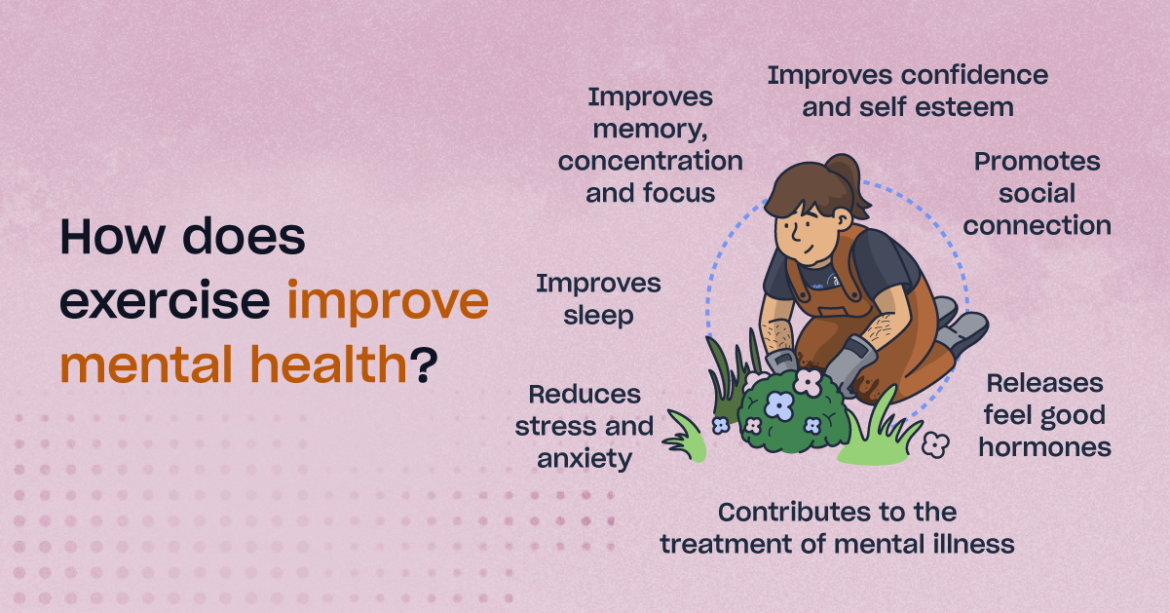Introduction
Exercise is not only beneficial for physical health but also plays a powerful role in improving mental well-being. Regular physical activity has been shown to reduce stress, ease symptoms of depression and anxiety, improve mood, and sharpen cognitive function. Understanding how movement affects the brain can encourage people to make exercise a consistent part of their lifestyle.
The Science Behind Exercise and Mental Health
When you engage in physical activity, your body releases endorphins—natural mood boosters often referred to as “feel-good hormones.” Exercise also reduces levels of stress hormones like cortisol and adrenaline, creating a more relaxed state of mind.
Key Mental Health Benefits of Exercise
1. Reduces Symptoms of Depression and Anxiety
- Exercise increases serotonin and dopamine, chemicals linked to happiness.
- Physical activity can be as effective as medication in some cases of mild to moderate depression.
- Anxiety symptoms often decrease after even short workouts.
2. Boosts Self-Esteem and Confidence
- Achieving fitness goals enhances self-worth.
- Improved body image contributes to greater confidence and positivity.
3. Improves Sleep Quality
- Exercise helps regulate sleep cycles.
- Deeper, more restorative sleep reduces stress and improves mood stability.
4. Enhances Brain Function and Focus
- Increases blood flow to the brain, improving memory and learning.
- Stimulates the growth of new brain cells (neurogenesis).
- May protect against cognitive decline and dementia.
5. Provides Stress Relief
- Physical activity distracts the mind from worries.
- Activities like yoga, tai chi, or even walking lower stress and promote calmness.
Best Types of Exercise for Mental Health
- Aerobic exercises: Running, cycling, and swimming improve mood and energy.
- Strength training: Builds resilience and reduces symptoms of depression.
- Mind-body exercises: Yoga, pilates, and meditation-based workouts help with stress and anxiety.
- Outdoor activities: Walking in nature or hiking provides both physical and mental refreshment.
How Much Exercise Do You Need?
Experts recommend at least 30 minutes of moderate exercise five times a week. Even shorter bursts of activity, such as 10–15 minutes of walking, can improve mood and reduce stress levels.
Incorporating Exercise into Daily Life
- Take the stairs instead of the elevator.
- Go for a brisk walk during breaks.
- Join group classes for accountability and social interaction.
- Start small and gradually increase intensity to build consistency.
Conclusion
Exercise is one of the most effective, natural tools for improving mental health. By reducing stress, boosting mood, and enhancing cognitive function, physical activity supports both the mind and body. Making regular exercise a priority can transform overall well-being.
FAQs
Q1: How quickly does exercise improve mental health?
Some benefits, like stress relief, are immediate, while mood and anxiety improvements may appear within a few weeks of consistent activity.
Q2: Can exercise replace therapy or medication?
Exercise can complement treatment but should not replace professional care for severe mental health conditions.
Q3: What’s the best exercise for anxiety?
Yoga, meditation-based exercises, and aerobic activities like walking or swimming are highly effective.
Q4: Do I need to go to the gym to see benefits?
No, home workouts, outdoor activities, and daily movement all provide mental health benefits.
Q5: Can exercise prevent mental illness?
While it may not completely prevent mental health conditions, regular activity lowers risk and helps build resilience.


